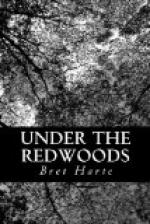through quiet and the simplest environment. The
lee side of a straggling vine in the meadow, or even
the thin ridge of cast-up drift on the shore, behind
which they would lie for hours motionless, was a sufficient
barrier against prying eyes. In this occupation
they no longer talked together, but followed each other
with the blind instinct of animals—yet
always unerringly, as if conscious of each other’s
plans. Strangely enough, it was the
real
animal alone—their nameless dog—who
now betrayed impatience and a certain human infirmity
of temper. The concealment they were resigned
to, the sufferings they mutely accepted, he alone
resented! When certain scents or sounds, imperceptible
to their senses, were blown across their path, he
would, with bristling back, snarl himself into guttural
and strangulated fury. Yet, in their apathy,
even this would have passed them unnoticed, but that
on the second night he disappeared suddenly, returning
after two hours’ absence with bloody jaws—replete,
but still slinking and snappish. It was only
in the morning that, creeping on their hands and knees
through the stubble, they came upon the torn and mangled
carcass of a sheep. The two men looked at each
other without speaking—they knew what this
act of rapine meant to themselves. It meant a
fresh hue and cry after them—it meant that
their starving companion had helped to draw the net
closer round them. The Indian grunted, Li Tee
smiled vacantly; but with their knives and fingers
they finished what the dog had begun, and became equally
culpable. But that they were heathens, they could
not have achieved a delicate ethical responsibility
in a more Christian-like way.
Yet the rice-fed Li Tee suffered most in their privations.
His habitual apathy increased with a certain physical
lethargy which Jim could not understand. When
they were apart he sometimes found Li Tee stretched
on his back with an odd stare in his eyes, and once,
at a distance, he thought he saw a vague thin vapor
drift from where the Chinese boy was lying and vanish
as he approached. When he tried to arouse him
there was a weak drawl in his voice and a drug-like
odor in his breath. Jim dragged him to a more
substantial shelter, a thicket of alder. It was
dangerously near the frequented road, but a vague idea
had sprung up in Jim’s now troubled mind that,
equal vagabonds though they were, Li Tee had more
claims upon civilization, through those of his own
race who were permitted to live among the white men,
and were not hunted to “reservations”
and confined there like Jim’s people. If
Li Tee was “heap sick,” other Chinamen
might find and nurse him. As for Li Tee, he had
lately said, in a more lucid interval: “Me
go dead—allee samee Mellikan boy.
You go dead too—allee samee,” and
then lay down again with a glassy stare in his eyes.
Far from being frightened at this, Jim attributed
his condition to some enchantment that Li Tee had evoked
from one of his gods—just as he himself




